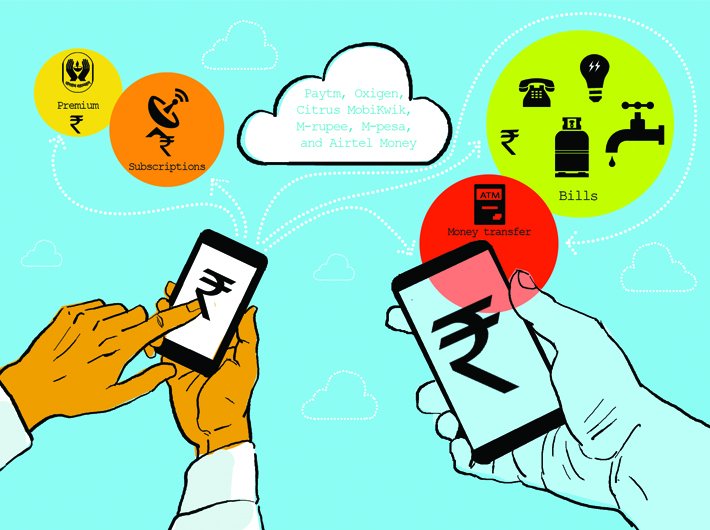With m-wallet players getting payment bank licence, unbanked population with mobile phones will be able to receive benefits of banking
E-retailers are adopting and adapting to mobile money and wallets riding on the back of an explosion in the use of smartphones in India. Business consulting service firm RNCOS estimates the Indian m-wallet market is worth '350 crore currently, and will touch '1,210 crore by 2019. Mobile wallet is largely used for making small payments online to avail micro-services like recharging mobile phone, booking tickets, paying utility bills and small ticket shopping. Several m-wallet service providers are working to let consumers shop offline with their digital wallets. Currently, the m-wallet is driven primarily by non-banking players like Paytm, Oxigen, Citrus MobiKwik, M-rupee, M-pesa and Airtel Money.
Under RBI guidelines, they are categorised as semi-closed wallet that allows them to facilitate payment at multiple e-platforms but doesn’t permit cash withdrawal facility from their m-wallet. Semi-closed prepaid payment instruments permit only payment of utility bills or essential services up to a limit of '10,000 and can be issued without any KYC being undertaken by the issuer. What this mean is that to offer cash-out facility, semi-closed wallets have to tie up with a bank. For example, Vodafone’s m-pesa has partnered with ICICI bank that enables ICICI bank account holders to avail withdrawal facility from their wallets by visiting nearby ATM, branch or m-pesa outlet. From his or her m-pesa account, a person can transfer money to the bank account of any person. However, if that person sends money in another m-pesa account, the receiver should have an account with ICICI bank to withdraw money from his or her digital wallet. Such a system deprives the unbanked population from enjoying the privileges of mobile technology, which has remained confined only to urban areas.
Payment banks to pave the way
Despite the government’s efforts for digital financial inclusion through pradhan mantri jan-dhan yojana scheme, which was launched last year, the World Bank estimates that over 230 million Indians still pay utility bills in cash. Moreover, close to 43 percent of bank accounts remained inactive in 2014. Acknowledging the challenges faced by formal banks in driving financial inclusion, the RBI on August 2015 granted in-principal payment bank licence to 11 non-banking entities. The central bank, through these payment banks, expects to tap low-income households, migrant labourers and small businesses, by offering them services such as savings account of up to the limit of '1,00,000 per customer and remittance services with low transaction cost. Like formal banks, these banks can provide basic banking privileges but are not allowed to offer credit cards or loan to their customers. Among the companies that have received the licence are Paytm, Vodafone and Airtel, which are already the big players of the m-wallet market. The licence will give them the opportunity to expand their reach of digital platform. It will not only allow them to raise their fund limit and provide interest on the deposits, but also allow their users to cash-out money from their m-wallet. This step by RBI will eventually make smart phones essential tool for achieving universal banking ecosystem.
Vodafone India contributes a large portion in the m-wallet economy. Its wallet M-pesa has three million users and 95,000 agents. With the payment bank license the company is now looking at tapping the opportunity of bringing the unbanked Indians under digital economy. Suresh Sethi, business head, M-pesa told Governance Now: “We have been working towards driving the financial inclusion agenda over the past few years now. We believe there is opportunity to include millions of Indians who do not have access to bank accounts or even have bank in their villages but want to be part of the digital economy. These people want the ability to send money, buy goods and services and be part of the digital economy.” He stressed that the payment bank licence will be a huge enabler for its m-wallet service. “It will allow cash-out without having bank at the bank end since m-pesa will itself be a bank after fulfilling the requirements to set up payment bank. Our business correspondent network is as big as the entire banking network put together, which is 1,17,000 bank branches.”
Fino PayTech Limited, one of the 11 licence holders, is currently into the service of extending banking facilities of its registered bank members in rural areas. It has 25,000 business correspondent agents on field and 450 branches, according to the company’s statistics. Speaking on mobile technology, Rajeev Arora, director, Fino, said, “M-wallet is one of the ways through which we will be able to bring more people on to a digital platform for undertaking banking and financial transactions. This is a huge opportunity as over 90 percent of transactions in our country are in cash and it can be converted to digital format if adequate customer awareness is created. To serve the unbanked population a payment bank would require a physical as well as digital presence to address the various issues such as connectivity, accessibility, user ability and convenience.”
The m-wallet approach
To facilitate technology solutions in rural areas, it is crucial for the license holders to have accessible banking points. It includes availability of mobile phones, kiosks and internet-enabled outlets. “Localisation or accessibility of banking applications in local languages is also very important,” explained Arora. “Uninterrupted connectivity and financial literacy are the other key concerns that have to be addressed before one builds a digital network for payment banks.” Payment banks, however, can only be successful if the government is able to execute its schemes in an integrated manner through a converged digital approach. “Telecoms can play very important role in the transfer of subsidy to intended beneficiaries. With the grant of payment bank license, our efforts will be towards making the inactive savings accounts under jan-dhan yojana active,” said Sethi.
Meanwhile, Oxigen, an early player in the m-wallet sector and also one of the companies seeking payment bank license, is working on the field with its digital tools towards financial inclusion. Even though the company has its share of disappointment for not being granted the payment bank license despite having 200,000 retail touch-points across India, it is continuing to offer services to bring unbanked onboard. One such service is Super POS that the company launched earlier this year. The multi-purpose machine is designed to work as a micro ATM. Pramod Saxena, founder, Oxigen, said, “The device is nothing but a mobile phone. People in rural areas may not have best of smart phones and hence the retailers need a convenient system that can do multiple things. Device POS is improvisation of a mobile phone with two SIM card slots. It works as a micro ATM.” The devise comes with a biometric reader that is utilised for performing e-KYC for opening bank accounts instantly. “Let us say a migrant has sent cash through his wallet to someone who may not have a bank account to withdraw cash from the digital wallet. This is where the Oxigen solution plays a crucial role. The person can take his mobile phone to the nearby merchant or business correspondent agent of Oxigen. By using the super PoS machine, the agent at the counter can instantly open the user’s account with their partner banks, and allow the person to withdraw cash from his wallet by linking it with his newly opened bank account,” explained Saxena. The process, however, requires the person to be Aadhaar-card holder.
Extending banks’ reach to villages, the company has plans to roll out more such touch points to facilitate the service. “Our plan is to deploy additional 2,00,000 of these PoS across India in next three years plus another 3,00,000 with help of banks to have a Super PoS base of 5,00,000 retail touch points,” he added. Oxigen has already opened 5,000 SBI accounts in rural areas. With a payment bank, M-wallet will be able to reach where banks couldn’t so far. It will build a new platform to bring the unbanked population onto the mainstream world. With cash-out facility in m-wallet, payment bank license holders will have the ability to connect them with the digital economy through smart phones. However, it is also important for them to first construct a sustaining ecosystem in order to accommodate the technology for the users, who have so far been kept away from advantages of technology.



